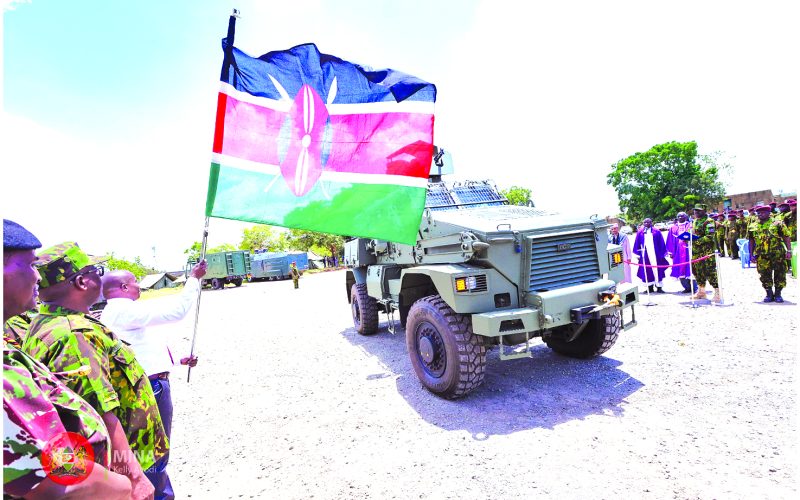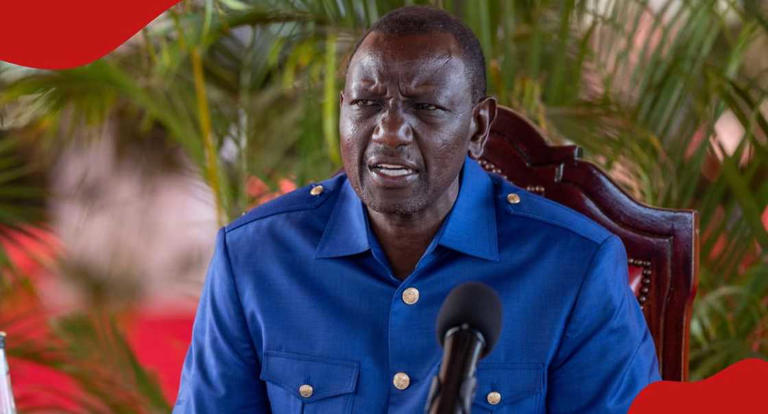By Moses Muli Published: August 30,2024 10:32 AM During a town hall meeting on Thursday,…

State spends Ksh7b on advanced police gear
By Moses Muli
Published: July 29,2024 11:28 AM
The government has invested Sh7.6 billion and plans to allocate a further Sh29.4 billion in the next three years to protect police officers and secure the nation.
The investment is under a programme that aims to equip the police with advanced gear, including armored personnel carriers, mine-resistant vehicles, drones, gunship helicopters, minesweepers, and personal protection gear.
“The new equipment is expected to bolster operations such as Operation Maliza Uhalifu in the North Rift Valley and counter-terrorism efforts in the northeastern region and the Boni enclave in Lamu County,” the Interior ministry said.
The efforts target services in underserved and vulnerable areas, focusing on improving governance to ensure public safety and national security while creating a conducive environment for economic development, the ministry said.
Independent entity
In related efforts, the National Police Service (NPS) is now an independent entity after its budget was transferred from the Office of the President, empowering the Inspector General as the accounting officer. In the 2024/25 financial year, for example, the NPS has been allocated a substantial Sh110 billion.
Other measures to reform the service include setting up the National Taskforce on Police Reforms, which was led by former Chief Justice David Maraga and whose report was handed over to the President in November 2023.
“The Interior ministry has since finalized a comprehensive strategic framework to unpack and implement the report that identified 271 recommendations for the Police, 210 for Prisons, and 117 for the National Youth Service (NYS),” the ministry said.
Service charters
The first phase of implementing the reforms has prioritized actions requiring no additional funding, such as revising service charters and developing new service standards.
“We are similarly bringing development partners to the table to support some of the projects and programmes identified in the recommendations,” said Internal Security PS Raymond Omollo.
The government, he added, had eliminated discriminatory processes related to ethnicity or religion, including vetting of some Kenyans before they could be issued with a national identity card.
“Every Kenyan should be treated equally. We have changed the old policy and have concluded the policy documents. There will no longer be vetting for people who want to get their IDs,” President William Ruto said previously.
Discriminatory process
The government abolished, as of May 2024, the vetting process previously required for certain ethnic groups.
The President said the previous process, which required additional documentation such as the birth certificates of parents and grandparents, was discriminatory and hindered many individuals from obtaining their IDs.
The government has also recognised the citizenship of the Pemba community, Omollo said.
The Pemba, who have lived in Kenya’s coastal region for decades, were previously stateless and lacked official recognition.
This had hindered access to essential services such as healthcare and education and prevented them from obtaining identity documents.
Enhanced collaboration
The Interior ministry has also said the coming to force of the Public Benefit Organizations Act on May 14 had ushered in an era of enhanced collaboration and transparency for PBOs.
A key element of this new legal framework is its potential to expedite the registration of the organisations, and this expected efficiency is crucial, especially in times of humanitarian crises.
“A faster registration process means that PBOs can mobilise resources and respond to emergencies more swiftly, providing timely assistance to those in desperate need,” Omollo noted.
The PBO Act creates an enabling environment for these organisations to operate with greater efficiency and effectiveness. It also introduces a regulatory and administrative framework that enhances transparency.



This Post Has 0 Comments